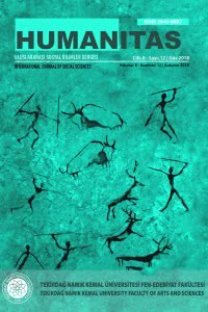JEAN ECHENOZ’UN BEN GİDİYORUM ROMANINDA DEĞİŞKEN ANLATI VE ANTİ-DEDEKTİF
Bu çalışma, sanat galerisi sahibi başkahraman Félix Ferrer’in kuzey kutbuna seyahat etmesini ve batan bir geminin enkazından sanat eserleriyle Paris’e dönmesini, ancak bu değerli eşyalar gizemli bir biçimde çalınmasını konu edinen Jean Echenoz’un Ben Gidiyorum (Je m’en vais) romanını incelemeyi amaçlar. Sanat galerisi sahibi başkahraman Félix Ferrer kuzey kutbuna seyahat eder ve batan bir geminin enkazından sanat eserleriyle Paris’e döner, ancak bu değerli eşyalar gizemli bir biçimde çalınır. Romanda, anlatıcı bu nesneleri bulmak için yapılan yolculuğu, sonrasında çalınmasına ve tekrar bulunmasına kadar olan süreçleri kahramanın etrafında gelişen olayları merkeze alarak aktarır. Soruşturmayı sürdürmek için gerekli yeteneklere sahip olmayan Ferrer, sonucu ironik bir biçimde rastgele ve gelişigüzel şekilde elde eden bir anti-dedektif olarak görülür. Makale, birbirini izleyen/değişken anlatı yapısına ve polisiye türünün romansal sözleşmelerinin yeniden düzenlenmesine odaklanarak, anlatının değişken kompozisyonu, anlatıcının sadakatsizliği, soruşturma ve soruşturma kavramlarını olası dünyalar, anlatıbilim ve kurgu teorileri çerçevesinde çözümlemeyi hedefler.
Anahtar Kelimeler:
Kurmaca, kodların yeniden düzenlenmesi, değişken anlatı yapısı, soruşturma, dedektif
ALTERNATING NARRATION AND THE ANTI-DETECTIVE IN I AM GONE BY JEAN ECHENOZ
The present work seeks to analyze the novel titled I am gone (Je m’en vais) by the French novel's contemporary author Jean Echenoz who is known for his intention to play with the novelistic codes of the various sub-genres. The protagonist Félix Ferrer, owner of an art gallery, manipulated by his colleague, travels to the North Pole and returns to Paris with art objects which are lost in the sinking of a boat, but these precious articles are mysteriously stolen. In the novel, the narrator narrates the journey to find these objects, the processes until they are stolen and found by focusing on the events around the hero. The protagonist without the talent of carrying out an investigation figures as an anti-detective who ironically obtains the result in a random and aleatory way. The paper aims to highlight the fundamental characteristics of the novel to give an idea of the current trends in narrative forms via this story by focusing on the alternating structure and realignment of novelistic conventions of the detective fiction genre preferably. The divergent composition of the narrative, the infidelity of the narrator, the notions of the investigation and the investigator will be studied in order to show the romantic discourse of Jean Echenoz. The writer revises the components of the narrative at the thematic level as well as at the diegetic levels by modifying the functions of the narrative elements. This article mainly aims to analyze the narrative within the framework of possible world theories, narratology, and theories of fiction.
Keywords:
Fiction, restructuring of codes, alternating structure, investigation, dedective,
___
- Çağlakpınar, B. (2018). Les éléments de la fiction dans le roman moderne: J. Echenoz, E. Carrère, D. Foenkinos (Thèse de Doctorat publiée). Université d’İstanbul, İstanbul.
- Del Lungo, A. (1993). Pour une poétique de l’incipit. Poétique, 94, 130-152.
- Deramond, S. (2012). Minimalisme et spatialité chez Jean Echenoz. M. Dambre et B. Blanckeman (Ed.) dans Romanciers minimalistes. (pp. 93-101). Paris: Presses Sorbonne Nouvelle.
- Dubois, J. (2006). Le roman policier ou la modernité. Paris: Armand Colin.
- Echenoz, J. (1999). Je m’en vais. Paris: Éditions de Minuit.
- Echenoz, J. (1997). Un an. Paris: Éditions de Minuit.
- Genette, G. (1983). Nouveau discours du récit. Paris: Seuil.
- Lintvelt, J. (1981). Essai de typologie narrative: Théorie et analyse. Paris : José Corti.
- Pavel, T. (1988). Univers de la fiction. Paris: Seuil.
- Pouillon, J. (1954). Temps et Roman. Paris: Gallimard.
- Rullier-Theuret, F. (2001). Approche du roman. Paris: Hachette.
- Todorov, T. (1966). Les catégories du récit littéraire. Communications, 8, 125-151.
- Tilbe, A. et Sezgintürk, P. (2015). Yeniötesi evrenin yansısı küçürek bir anlatı: Jean Echenoz’dan Ben Gidiyorum. Humanitas, 6, 253-274.
- Vuillaume, M. (1990). Grammaire temporelle des récits. Paris: Éditions de Minuit.
- Wagner, F. (2013). D’un retour de flamme pour la fiction romanesque. Itinéraires, 1, 29-49.
- ISSN: 2147-088X
- Yayın Aralığı: Yılda 2 Sayı
- Başlangıç: 2013
- Yayıncı: Namık Kemal Üniversitesi
Sayıdaki Diğer Makaleler
DÎVÂNU LUGÂTİ’T-TÜRK’TEKİ su- FİİLİ ÜZERİNE
MAHREMİYETİN DÖNÜŞÜMÜ VE İLETİŞİM ARAÇLARI
NİTEL ARAŞTIRMALARDA KONUMSALLIK VE DÜŞÜNÜMSELLİK: YAKINLIK VE MESAFE ARASI MÜZAKERE
BİREYSEL DUYARLILIKTAN KOLEKTİF DİSİPLİNE: MEHMET RAUF’UN HALAS ROMANI VE TÜRK MİLLİYETÇİSİ NİHAT
ILGAZ İLÇESİNİN YÖNETSEL COĞRAFYA ANALİZİ
LÉVI-STRAUSS’UN YAPISALCILIĞINI ALTÜST ETMEK: CİNSİYET BELASI’NI “BÜKÜLMÜŞ BRİCOLAGE” OLARAK OKUMAK
JEAN ECHENOZ’UN BEN GİDİYORUM ROMANINDA DEĞİŞKEN ANLATI VE ANTİ-DEDEKTİF
